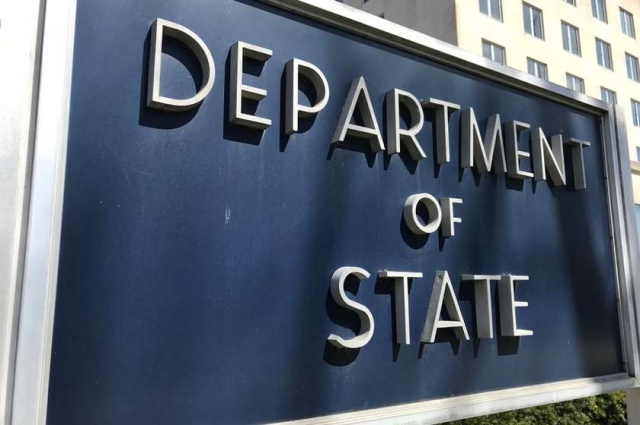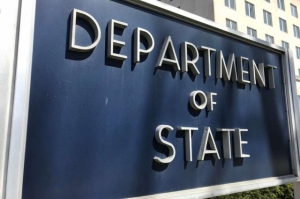US State Dept: Old Gov't Saw Property Transfers that Lacked Transparency
The US Department of State has published report on the investment climate in 170 countries, including Georgia.
The report says that overall, business and investment conditions are sound in Georgia.
The US Department of State emphasizes the progress made in terms of property rights in the country. It notes that the state does not expropriate property, although it is highlighted that under the previous government there were frequent cases of non-transparent and forced transfer of private property.
"Expropriation disputes are not common in Georgia, although under the previous government (before 2012), reputable NGOs raised cases of illegal revocation of historic ownership rights in Svaneti, Anaklia, Gonio, and Black Sea-adjacent territories. Under the previous government there were cases of property transfers that lacked transparency and allegedly were implemented under coercion," reads the document.
The report emphasizes US support for Georgia's sovereignty and territorial integrity. It focuses on Russia's aggression against Georgia in 2008 and also emphasizes that Russia continues to occupy Georgian territories and carries out provocations along the administrative border.
It also mentions that Georgia's legislative, regulatory and oversight system operates in a transparent manner and in compliance with international norms. It is emphasized that the 2018 constitutional amendments have strengthened the role of parliamentary oversight of the executive branch.
The document notes that Georgia ranks high in the 2020 World Bank’s Ease of Doing Business index and in the Heritage Foundation’s 2020 Economic Freedom Index.
“Georgia ranks seventh in the 2020 World Bank’s Ease of Doing Business index and twelfth in the Heritage Foundation’s 2020 Economic Freedom Index. Fiscal and monetary policy are focused on low deficits, low inflation, and a floating real exchange rate, although the latter has been affected by regional developments, including sanctions on Russia, and other external factors, such as a stronger dollar. Public debt and budget deficits remain under control. However, global challenges posed by COVID-19 and measures needed to mitigate the spread of the virus have placed significant pressure on the domestic currency and the local economy.
"The Georgian government’s “Georgia 2020” economic strategy, initially published in 2014, outlines economic policy priorities. It stresses the government’s commitment to business-friendly policies, such as low taxes, but also pledges to invest in human capital and to strive for inclusive growth across the country. The strategy also emphasizes Georgia’s geographic potential as a trade and logistics hub along the New Silk Road linking Asia and Europe via the Caucasus.
"Overall, business and investment conditions are sound. However, some companies have expressed an increasing lack of confidence in the judicial sector’s ability to adjudicate commercial cases independently or in a timely, competent manner, with some business dispute cases languishing in the court system for years. Other companies complain of inefficient decision-making processes at the municipal level, shortcomings in the enforcement of intellectual property rights, lack of effective anti-trust policies, selective enforcement of economic laws, and difficulties resolving disputes over property rights. The Georgian government continues to work to address these issues and, despite these remaining challenges, Georgia ranks high in the region as a good place to do business,” the report reads.
The report of the State Department also mentions the port of Anaklia.
“Transit and logistics are a priority sector as Georgia seeks to benefit from increased East/West trade through the country. The Baku-Tbilisi-Kars railroad has boosted Georgia’s transit prospects. The Anaklia Deep Sea Port project, however, has faced multiple delays and extensions since its initial contract in 2016. The government terminated its contract with the Anaklia Development Consortium in 2020, asserting the consortium did not mobilize the capital necessary to implement the project. However, the government said it remained committed to the construction of a deep sea port in Anaklia and planned to retender the project. Logistics and port management companies in Poti have started development and expansion of Poti Port, currently the largest port in Georgia. Pace Group launched a $120 million project to develop a new port terminal at the site of the former Poti Shipbuilding Factory. Additionally, APM Terminals announced plans in 2019 to create a deep-sea port in Poti,” it reads.
Over the past 10 years, there have been more than 10 investment disputes involving US citizens (as of 2019, 5 cases are pending in arbitration), although no illegal action has been taken by the state against foreign investors during this period.
The document highlights the role of investments made by the US Government, in particular, completed and ongoing projects implemented by the US International Development Finance Corporation. For instance, in 2019, funding allocated to Pay Terminal and Liberty Bank.
The political part of the report reads that street protests are rare in Georgia, however, in June 2019, when protesters attempted to invade Parliament, police used legal force to stop them.
The US Department of State's Annual Investment Climate Report includes information on the investment climate in 170 countries, prepared by economic officers from local US embassies. They analyze the economies of countries that are recipients of American investment or have the potential to attract American companies.
By Ana Dumbadze
See the full report here











